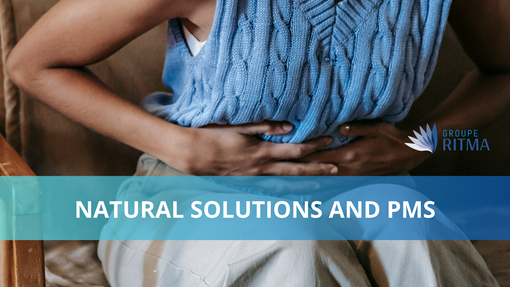
Chronicles
16 August 2023
Natural Solutions and PMS

The premenstrual syndrome (PMS) affects around 80% of women at least once in their lifetime. Its manifestation varies according to the environment and lifestyle of each individual. Naturopathy offers natural solutions to mitigate its effects.
PMS includes various physical and emotional symptoms that occur before menstruation. Although its duration is usually a few days, it can sometimes persist up to three weeks before the arrival of the periods.
The signs differ from one woman to another and even from one cycle to another, but all are generally badly experienced.
Some of the main symptoms of this hormonal imbalance include pain, swelling, mood swings and food cravings.
It is important to emphasize that PMS is not a normal condition. Although hormonal fluctuations are an integral part of the female cycle, the inconveniences they cause should not be considered normal.
PMS generates discomfort and suffering for many women. However, due to a lack of specific studies, the exact numbers remain unknown. More and more women are beginning to openly address this issue, but most still view unpleasantness as part of femininity.
This is illustrated by the fact that it takes an average of 10 years to diagnose conditions like endometriosis or polycystic ovary syndrome (PCOS).
It is important to understand that PMS is not inevitable and that solutions exist to treat it.
PMS, what is it exactly?
PMS is characterized by a set of physical and emotional symptoms that manifest during the luteal phase, i.e., the period before menstruation. All women who feel changes in their body and who do not mentally identify with this period are affected.
This syndrome encompasses various symptoms such as pain, headaches, migraines, fatigue, exhaustion, mood swings, irritability, intestinal disorders (diarrhea, constipation, bloating), acne, water retention, chest discomfort, food cravings, among others .
Causes of PMS
The imbalance between estrogen and progesterone:
During the second half of the cycle, about 10 days before menstruation, there may be an excess of estrogen over progesterone. Normally, before menstruation, progesterone dominates. This imbalance may be due to poor degradation of estrogen by the liver after ovulation, aromatization of estrogen, or even excessive stress.
The role of the liver in estrogen breakdown
To regulate this imbalance, it is essential to support the liver in its process of estrogen breakdown. This involves adopting an appropriate diet, reducing the consumption of sugars, cooked and saturated fats, alcohol, sugary drinks, coffee, processed meats, dairy products and processed foods. On the contrary, it is advisable to increase the consumption of vegetables, fruits, complete cereals, fish, lean meats, eggs, legumes and vegetable oils rich in omega-3.
Herbs like artichoke, rosemary, black radish, and fumitory can help stimulate or support hepatic estrogen detoxification. In addition, B vitamins are crucial for complete liver detoxification.
Estrogen aromatization and PMS
Aromatization is the conversion of androgens (like testosterone) into different types of estrogen. Excess aromatization can cause premenstrual symptoms such as sore breasts, acne, excessive hair growth, etc. Various factors, such as stress, being overweight, a diet high in sugars and endocrine disruptors, contribute to this imbalance.
Metabolic syndrome
Modern society unfortunately tends to rely on a high-sugar diet, with sugary drinks, hidden sugars in ready meals and processed foods, and refined grains with a high glycemic index. This situation has led to an increase in the metabolic syndrome, characterized by metabolic, lipids, carbohydrate and vascular disorders that can lead to diabetes and cardiovascular disease.
There is often a link between high carbohydrate consumption and worsening of PMS symptoms. In some cases, an underlying metabolic syndrome may even be the cause of PMS. Therefore, regulating diet and working on metabolism as well as insulin resistance are crucial to easing period-related symptoms, such as acne and PCOS.
Impact of stress
Chronic stress leads to an increase in cortisol levels in the body. This can have health implications, including insulin resistance, chronic inflammation, nerve imbalance, and serotonin deficiency. Especially during the second half of the cycle, before menstruation, stress can intensify premenstrual symptoms such as mood swings, irritability, depression, pain, acne, etc.
To effectively address PMS, it is crucial to have a global approach by favoring a healthy diet and a balanced lifestyle, but also by working on the underlying blockages and restoring circulation in the abdominal and pelvic region.
The lumbar spine as well as the lower limbs, including the feet, ankles and knees, should be maintained in a state of maximum freedom. At the same time, it is necessary to take care of the internal organs, particularly the often-congested liver, as well as the parts of the digestive tract such as the colonic frame, the ascending and descending colon, and the small pelvis.
Several osteopathy sessions may be required to obtain satisfactory results.
The osteopathic support will be all the more effective if it is initiated early, thus making it possible to stop the progression of the symptoms. Indeed, it is easier to intervene on an adolescent girl than on an older woman in whom the structural alterations due to a prolonged development are less reversible.